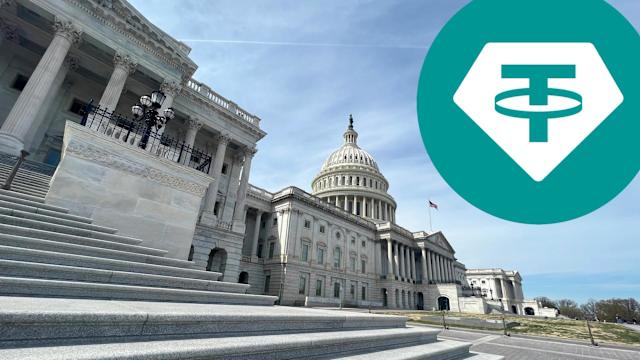The Tether Dilemma: Compliance and Competition in the U.S. Stablecoin Market

Tether, the world's leading stablecoin, has a digital emulation of the U.S. dollar that stands at an impressive 155 billion as of the last count. However, with the impending legislation on Tuesday afternoon, Tether faces a crucial decision: either jump through the compliance hoops to reach U.S. market standards or hold onto its non-U.S. market share as the U.S. industry potentially increases in scale and the federal government takes its customary role in steering regulatory demands globally. The Guiding and Establishing National Innovation for U.S. Stablecoins of 2025 (GENIUS) Act is currently facing its final path toward passage in the U.S. Senate, marking a first for major crypto legislation. If passed, it will head to the House of Representatives for approval or further work. Both chambers must agree on the same language for President Donald Trump to sign it into law. In its current form, the legislation leaves a path for foreign stablecoin issuers in the U.S., but it could be a complicated one. Companies like Tether would need to be regulated by a foreign regime that has similar standards as the U.S., and depending on the final language, they would likely need to register with and be overseen by the Office of the Comptroller of the Currency, a federal banking regulator, while maintaining "reserves in a United States financial institution sufficient to meet liquidity demands of United States customers" in case of a collapse. All issuers overseen by the potential law would have to follow strict reserve standards, maintaining cash, Treasuries, and other highly-liquid assets that match their issuance one-for-one. They'd also need to be reviewed monthly by a registered public accounting firm, with the results certified by the CEO and CFO of the company, meaning top executives would face legal liability for misleading the public. This unusually robust oversight would require more frequent public assurances from stablecoin issuers than other financial institutions. Additionally, companies must meet the full suite of money-laundering controls faced by U.S. financial firms. Tether CEO Paolo Ardoino has signaled that the company may not try to get its market-leading token into the U.S. as a direct issuer but is considering a U.S.-based offshoot settlement stablecoin that could be fully regulated domestically. However, Tether faces significant challenges in complying with U.S. regulations, which could be a considerable investment of time, effort, people, money, and technology. Despite strong rhetoric from critics like Senator Elizabeth Warren, who argues that the GENIUS Act allows a major loophole for unregulated foreign stablecoins to be circulated on decentralized crypto platforms in the U.S., Tether's ally in Trump's administration, Commerce Secretary Howard Lutnick, whose former role at Cantor Fitzgerald saw him managing Tether's U.S. reserves, may influence how things play out in the House. U.S. company Circle and its USDC have been waiting in the wings to seize market share from Tether, and Circle intends to be inside what some expect to be a U
The article, 'The Tether Dilemma: Compliance and Competition in the U.S Stablecoin Market,' provides a nuanced analysis of how regulatory compliance influences competition among stablecoins while highlighting potential risks for market stability.
The doc gives a thought-provoking analysis of the delicate balance between compliance and competition within U.S.'s stablecoin market, highlighting how Tether' Big Bang Regulatory debut could shape future regulation in this emerging financial frontier.
The Tether Dilemma provides a thought-provoking analysis of the intricate interplay between compliance and competition within America's stablecoin market, highlighting both inherent challenges to fairness in such an environment as well promising avenues for future regulation.
This article, 'The Tether Dilemma: Compliance and Competition in the U.S Stablecoin Market,' adeptly navigates through complex regulatory landscapes to dissect how rule adherence impacts market dynamics for stablecoins like USDT.
The Tether Dilemma addresses the complex web of compliance and competition in today's U.S stablecoin market, offering a nuanced analysis on how economies are navigating regulations that balance security with innovation.
The paper, 'Tether Dilemma: Compliance and Competition in the U.S.' Stablecoin Market,' offers a nuanced analysis on how regulating Tethers both enhances compliance while simultaneously fostering competition within America's stablecoin landscape – ultimately impacting consumer trust.
#TheTetherDilemma highlights critical issues of compliance and competition in the U.S stablecoin market, providing insights into how regulations can balance innovation with investor protection amidst prevailing global currencies' volatility.
The paper, The Tether Dilemma: Compliance and Competition in the U.S.'s Stablecoin Market, provides a compelling analysis of regulatory challenges facing US stablecoins amidst increasing competition while addressing their crucial role as financial intermediaries for market stability."
The paper explores the complex interplay between compliance and competition in U.S.'s stablecoin market, highlighting The Tether Dilemma as an exemplar of how regulation can both enable safe adoption while also shaping competitive dynamics.
Combating the Tether dilemma requires a delicate balancing act between maintaining compliance and preserving competition in America's stablecoin market, ultimately serving to protect both investors’ interests while fostering innovation.














